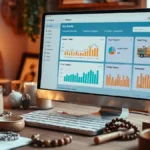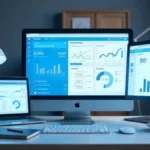In a digital age where 7.5 million new blog posts are published every day, crafting a personal blog offers a unique voice amidst the vast sea of information. A personal blog is not merely an online journal but an extension of one’s personality, passions, and perspectives. It provides a platform for sharing expertise, connecting with like-minded individuals, and even sparking impactful conversations.
Creating your personal blog requires strategic decisions—starting with choosing a niche that reflects your interests and expertise. Platforms like WordPress and Blogger provide user-friendly interfaces, making it possible to launch a blog in hours while customizing it to reflect your style. Integrating appealing content with consistent posting schedules is pivotal, as studies suggest that bloggers see significant traffic when publishing two to four times a week.
A personal blog is an individual’s online platform for sharing thoughts, experiences, and knowledge on various topics.
- Choose a blogging platform like WordPress or Blogger.
- Select a domain name that reflects your theme.
- Design your blog with customizable templates.
- Create engaging content consistently.
- Promote your blog through social media and SEO practices.
What is a Personal Blog?
A personal blog is an online space where individuals share their thoughts, experiences, and ideas with the world. It’s like a digital diary, but more public and interactive. People write about various topics they are passionate about, from travel to cooking, and everything in between. Unlike a traditional blog, it’s often more informal and personal. This makes it a great way to connect with others who have similar interests.
Through a personal blog, people can express their opinions and connect with a larger audience. Readers can comment, share, and even start conversations. This engagement makes blogging a dynamic form of communication. Personal blogs can also include multimedia elements like videos and images to enhance storytelling. The visual aspect adds a new layer to the reader’s experience.
One of the main reasons people start personal blogs is to build an online presence or portfolio. This becomes especially useful for those looking to establish their expertise in a particular field. Some users also monetize their blogs through ads or sponsored content. However, the core is usually the joy of sharing and storytelling. Ultimately, it’s a space where creativity meets the online community.
With platforms like WordPress or Blogger, launching a personal blog is easier than ever. These platforms offer customizable templates to match any style or theme desired. Bloggers can also track their website traffic, allowing them to see which posts are popular. This data helps in refining content and engaging more readers. Overall, a personal blog is a versatile tool for self-expression and connection.
Defining the Concept of a Personal Blog
A personal blog is a digital platform where individuals express their unique thoughts and perspectives. It serves as an open journal, allowing for creativity and exploration. Bloggers often write about personal interests or daily experiences. This makes each blog as unique as its creator. The main goal is self-expression rather than professional writing.
The style of a personal blog is typically more relaxed than that of a professional website. Posts often include personal anecdotes, observations, and reflections. The content is usually informal, creating a welcoming space for readers. This style helps build a connection between the blogger and the audience. Over time, this bond can grow into a community.
Many people start personal blogs to document their life journey. This can include topics like travel adventures, cooking experiments, or life lessons. The blog becomes a treasure trove of memories and stories. It’s also a space to share opinions on topics that matter to the writer. Personal blogs offer valuable insights into one’s character and values.
With simple tools and platforms, starting a personal blog is accessible to everyone. Users can choose various templates to fit their style. Basic HTML or design skills can enhance the blog’s appearance. Additionally, social media integration allows for broader sharing. This ensures that the blog reaches a wider audience.
Importance of Having a Personal Blog
Having a personal blog offers numerous benefits, one of which is a platform for self-expression. It allows individuals to share their thoughts on diverse topics. From hobbies to important social issues, the possibilities are endless. This outlet can be empowering and therapeutic. Over time, writing can enhance communication skills and boost self-confidence.
Another key advantage is that a personal blog can help build connections with like-minded people. Readers who share similar interests may comment or share your posts. This fosters a sense of community among bloggers and their audience. Through these interactions, valuable friendships can form. Online networking can sometimes lead to real-world opportunities as well.
Personal blogs can serve as a portfolio, showcasing your skills and talents to potential employers or collaborators. If a blogger is passionate about a specific subject, creating high-quality content can highlight expertise in that area. This increases visibility in the field, potentially leading to job offers or partnerships. Many businesses seek bloggers for collaborations that enhance brand reach. Blogging can also open doors to freelance writing or consulting gigs.
Additionally, personal blogs can generate income in various ways. Through advertising, affiliate marketing, or selling products, bloggers can earn money. This makes maintaining a blog both rewarding and profitable. Creating consistent, high-quality content is essential for attracting traffic and revenue. With time and dedication, a personal blog can become a valuable asset.
Steps to Create Your Own Personal Blog
The first step in creating your personal blog is selecting a blogging platform. Popular options include WordPress, Blogger, and Squarespace. These platforms offer user-friendly features and customizable templates. Choose the one that best suits your needs and technical skills. A good platform will make it easier to design and manage your blog.
Think about a domain name that reflects your personality or the themes you plan to explore in your blog. This name should be easy to remember and type. Once you have a name, you can register it with a domain registrar. Many people choose to pair their domain with hosting services. Some platforms offer bundled packages to simplify this step.
When designing your blog, focus on creating a layout that’s both attractive and easy to navigate. Utilize themes and plugins that match your style and ideas. Pay attention to color schemes, fonts, and page layout to ensure a professional look. Don’t forget to include essential pages such as “About Me” and “Contact”. These pages help establish credibility and provide ways for readers to reach you.
Once your blog is set up, think carefully about content creation. Draft an editorial calendar to plan your topics and posting schedule. This helps maintain consistency and keeps your readers engaged. When writing, remember to integrate keywords for SEO to improve your blog’s visibility. Consistency and quality of content play major roles in attracting and retaining visitors.
Promoting your blog is crucial to reaching a wider audience. Share your posts on social media platforms like Facebook, Twitter, and Instagram. Engage with your followers by responding to comments and messages.
- Joining blogging communities and forums can help drive traffic to your site.
- Collaborating with other bloggers exposes your work to new audiences.
All these efforts contribute to growing your blog’s readership.
Choosing the Right Platform for Your Personal Blog
Selecting the right platform is a crucial step in starting your personal blog. Different platforms offer various features and flexibility, so it’s essential to choose one that suits your needs. WordPress, for example, is highly popular for its extensive customization options and plugins. Blogger is another platform favored for its simplicity and ease of use. Each platform has its strengths, and knowing them can guide your decision.
Consider your technical skills when picking a platform. Beginners might prefer platforms that require less coding knowledge, like Wix or Blogger. For those with more experience, WordPress and Squarespace offer more advanced features. Hosting options also matter if you plan to have more control over your content. A hosted platform handles the technical details, while a self-hosted one is more flexible but requires more setup.
Budget can also influence your choice of a blogging platform. Some platforms are free but might limit certain features unless you pay for an upgrade. Keep in mind that investing in a domain name and hosting can add to costs. It’s wise to evaluate the long-term expenses a platform might incur. Starting with a budget-friendly option can be a smart move.
Think about the types of media and content you’ll post. If you plan to incorporate lots of images or videos, make sure the platform supports this easily. Integration with social media platforms is another feature many bloggers find useful. This helps in promoting your blog and engaging with your audience. Check if the platform easily syncs with social media sites for seamless sharing.
Future growth should also factor into your decision. As your blog expands, your needs might change. A platform that allows for scalability is key to accommodating evolving goals. Investigate if there are options for adding e-commerce features or additional plugins. This forward-thinking approach ensures your blog can grow without significant hassles.
Keys to Maintaining and Growing Your Personal Blog
Regularly updating your content is essential for keeping your blog fresh and interesting. Readers are more likely to return if they know new posts are coming. Consistency in posting also helps with SEO, as search engines favor sites with frequent updates. Use an editorial calendar to plan your topics and posting schedule. This habit keeps you organized and your content varied.
Engaging with your audience is another critical factor in growing your blog. Respond to comments and engage in discussions to build a community. This interaction makes your readers feel valued and more connected to your blog. Consider adding polls or surveys to involve them even more. These efforts can increase reader loyalty and blog traffic.
Using social media effectively can broaden your blog’s reach. Share your posts on different platforms like Facebook, Instagram, and Twitter. Encourage your followers to share your content as well. This can lead to more readers discovering your blog. Keep in mind that each social platform has its unique vibe and audience, so tailor your posts accordingly.
Monitor your blog’s performance using analytics tools. These tools help you understand which posts are doing well and which aren’t. Identifying patterns in your readers’ behavior can guide future content creation. Make adjustments as needed to meet your audience’s preferences. Regular analysis ensures your blog remains relevant and engaging.
Consider collaborations and guest posts to attract a wider audience. Partnering with other bloggers exposes your content to their followers. This cross-promotion can lead to new readership for both parties involved. Guest posts also offer fresh perspectives, keeping your blog dynamic. Look for opportunities that align with your blog’s themes and goals.
Frequently Asked Questions
Personal blogging is a fascinating digital arena where individuals share their unique stories, skills, and hobbies with a broad audience. Here, we address some common queries about starting and successfully growing a personal blog.
1. Why should I start a personal blog?
Starting a personal blog allows you to express your creativity while connecting with others. It’s a fantastic way to share your thoughts, showcase your talents, and build an online presence. Blogging can also help improve writing skills, offering a platform for experimentation and personal growth.
Moreover, a personal blog can open opportunities for networking and collaboration. It can create paths for partnerships, guest writing, and even speaking engagements. It’s a versatile tool that serves both personal and professional development.
2. How do personal blogs generate income?
Personal blogs can generate income through various channels such as advertisements, sponsored posts, and affiliate marketing. Bloggers partner with brands to write reviews or promote products that align with their content. These partnerships often include monetary compensation or free products.
Additionally, selling digital or physical products like e-books, merchandise, or courses can contribute to income. Many bloggers diversify their earnings by combining several of these strategies, turning their passion into a business.
3. What topics are best for a personal blog?
The best topics for a personal blog are those you are passionate about and knowledgeable in. Common themes include lifestyle, travel, food, wellness, and personal development. Choose subjects that inspire you because this enthusiasm will resonate with your audience.
Focusing on a niche market can attract a dedicated audience interested in that specific topic. This approach helps in creating more targeted content, making it easier to gain regular and engaged readers.
4. How often should I update my personal blog?
Consistency is key to maintaining a successful blog. Ideally, aim to publish new content once or twice a week. This frequency keeps your audience engaged and increases your blog’s visibility on search engines. Regular updates help establish a routine that readers can anticipate.
However, it’s essential to maintain quality over quantity. Each post should offer value, be unique, and align with your overall blogging goals. As you grow your blog, finding a balance that suits your workload and your audience’s expectations becomes important.
5. Can I start a personal blog with no technical expertise?
Absolutely, you can start a personal blog with little to no technical expertise. Many platforms like WordPress and Blogger are user-friendly, offering templates and guides to simplify the process. These tools require minimal coding knowledge, making blogging accessible to everyone.
In case you encounter technical challenges, online resources, forums, and communities provide support and solutions. With some research and experimentation, managing a blog becomes a rewarding experience. The key is to start small and expand as your skills and confidence grow.
Conclusion
Creating a personal blog is a meaningful journey that blends creativity, self-expression, and connection. It provides a platform to share passions and establish a unique voice in the digital world. Whether for personal fulfillment or professional growth, the advantages of maintaining a blog are compelling.
By focusing on engaging content and consistent updates, bloggers can cultivate a dedicated audience. This endeavor not only enhances communication skills but also opens doors to new opportunities. Embracing the dynamic nature of blogging can lead to both personal satisfaction and professional success.


